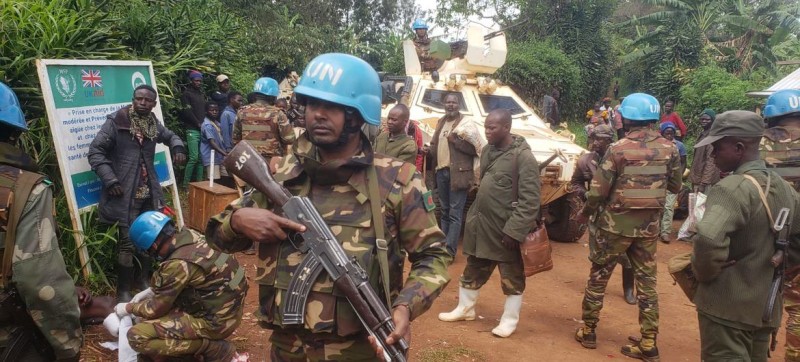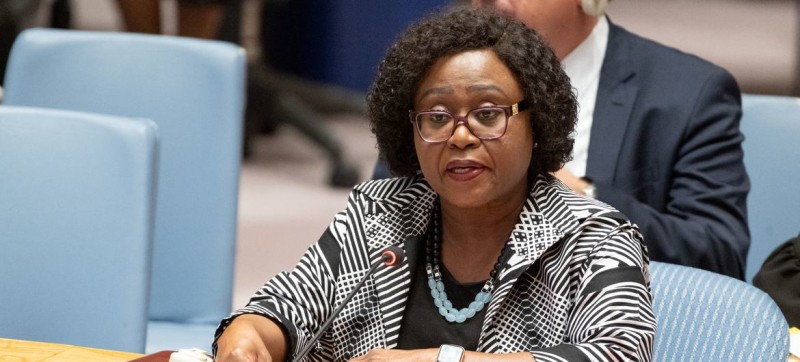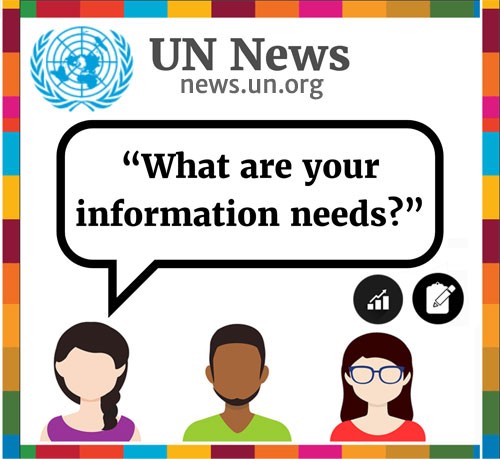
MONUSCO UN peacekeepers patrol the village of Logo in Djugu territory in eastern DR Congo.
“So far, the ceasefire between the M23 and the FARDC has held up relatively well and has contributed to some security gains”, said UN Assistant Secretary-General for Africa Martha Pobee.
“The relative calm in Rutshuru territory, for example, allowed more than 45,000 people from the Bishusha group to return home”, she said.
She noted, however, that M23’s withdrawal from territory has been “piecemeal, tactical, and political”, while the armed group still controls much of Masisi and Rutshuru, together with the movement of people and goods in these areas.
Moreover, its “offensive repositioning in recent weeks” raises fears that hostilities could resume at any time.
Disarming M23
She applauded the efforts of regional leaders to engage the parties concerned in implementing the decisions of the Luanda Road Map and the Nairobi process. She reiterated the readiness of the UN mission in DRC, MONUSCO, to back up Congolese authorities with the “pre-cantonment and disarmament” of the powerful rebel force.
Ms. Pobee said she was pleased to note that last week, MONUSCO, the East African Community Regional Force and the expanded Joint Verification Mechanism had undertaken a reconnaissance mission to the Rumangabo base, to assess the conditions for beginning the disarmament and demobilization process of M23 in earnest.
“For these efforts to bear fruit, it is urgent that the M23 withdraw completely from the occupied territories, lay down its arms unconditionally and join the Demobilization, Disarmament, Recovery and Community Stabilization Programme,” she added.
She noted the security gains in North Kivu are fragile and overshadowed by the deteriorating situation in Ituri province, which has suffered from the security vacuum created by the redeployment of FARDC to North Kivu.
More than 600 people have been killed by armed groups in the past three months, with CODECO, the Zairean militia and the ADF, being the main perpetrators of these atrocities.
The senior UN official urged all armed groups to “cease hostilities” and called for the redeployment of national security forces, particularly in Ituri, to restore State authority.
In response to the ongoing insecurity in eastern DRC, MONUSCO continues to “do everything possible to fulfill its mandate to protect civilians.” In Beni, Bunia, Bukavu and Goma, Mission-supported workshops eased tensions and strengthened local capacity to better respond to security challenges, including disinformation. At the same time, the Mission provided direct physical protection for civilians.
To date, between 50.000 and 70.000 displaced people are being protected by MONUSCO forces in the Roe site, located in Djugu territory, Ituri.

UN Photo/Eskinder Debebe Martha Ama Akyaa Pobee, Assistant Secretary-General for Africa in the Departments of Political and Peacebuilding Affairs and Peace Operations, briefs members of the UN Security Council.
Often ignored crisis
Insecurity in eastern DRC continued to fuel a long-standing humanitarian crisis often ignored by the international community, said Ms. Pobee.
An estimated 6.3 million people have been displaced within the country and since March 2022, more than 2.8 million have fled their homes in Ituri, North Kivu and South Kivu provinces due to insecurity.
Currently, around 28 per cent of the population of North Kivu and 39 per cent of Ituri’s regular population are displaced.
This situation has been further aggravated by inflation, epidemics and natural disasters, including last month’s floods in Kahele territory in South Kivu, which killed more than 470 people and left thousands missing. At the same time, nearly 26 million people, more than a quarter of the population, face food insecurity in the DRC.
The top Africa official expressed particular concern about the increasing number of women and girls who are becoming victims of gender-based violence and sexual exploitation. Gender-based violence increased by 2.3 per cent across the country and by 73 per cent in North Kivu province alone, compared to the same period last year.
She said the humanitarian response falls far short of the unprecedented level of need, welcoming the start of a system-wide scale-up response in eastern DRC for an initial period of three months.
Pockets of instability
In addition to security and humanitarian challenges in the east, pockets of instability have resurfaced in the west and south of the country. Violence persisted in Mai-Ndombe, Kwilu and Kwango provinces, and has spread to Maluku in Kinshasa province, Ms. Pobee said. Tensions and violence were also reported in Kindu, Tshopo and Katanga.
She urged authorities to hold perpetrators to account and take steps to strengthen social cohesion in order to preserve stability in these areas.
Hate speech continues
She said she was particularly alarmed by “the restriction of civic space and the increase in hate speech” and expressed concern at reports of an increase in violence against women political leaders and activists.
Regarding the scheduled departure of the peacekeeping mission MONUSCO, she said it was necessary to “stay the course for an orderly, gradual and responsible transition“.
“MONUSCO’s departure is planned and initial steps are being taken in several areas. However, MONUSCO’s withdrawal must not compromise the protection of civilians. We must avoid creating security vacuums,” she said.
“An orderly and responsible transition depends on the ability of national security forces to deploy and respond effectively wherever the security situation requires it,” she insisted.

2023 UN News User Survey
Thank you in advance for agreeing to participate in our survey so we can improve and tailor our products to your needs. The survey will take no more than 4 minutes to complete.

